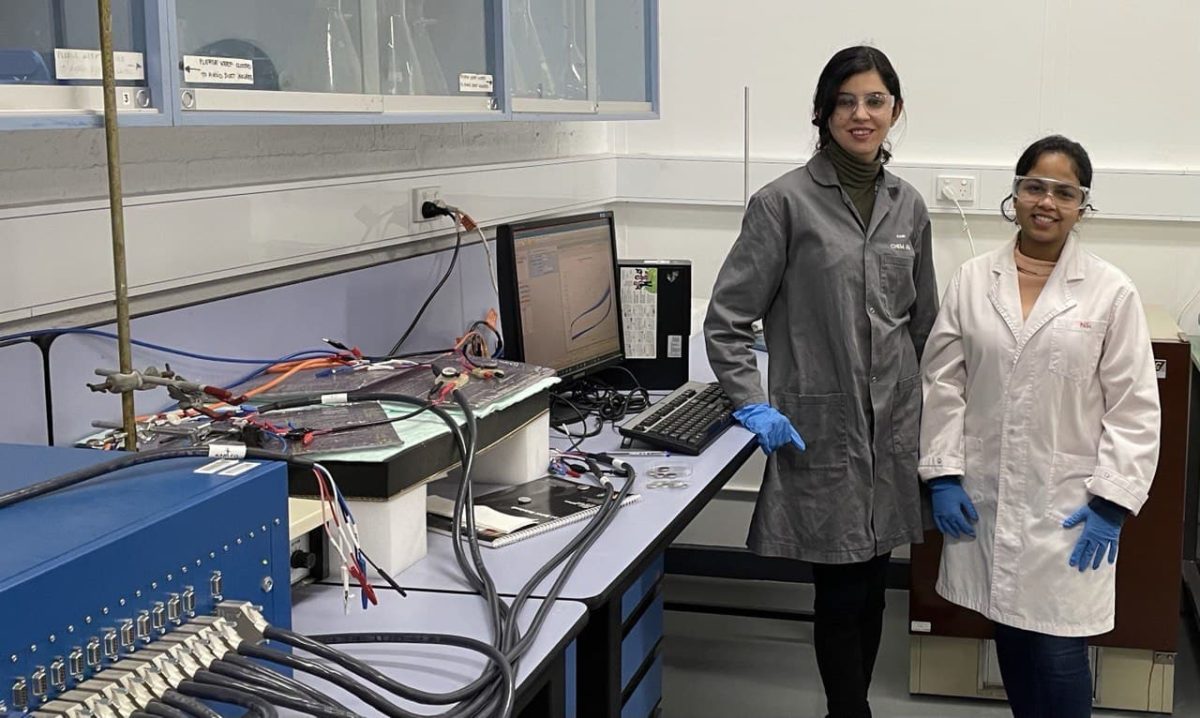When Rabeeh Golmohammadzadeh went to look for a job in lithium-ion battery recycling, a field she’d spent over seven years researching, she discovered her prospects in Australia were bleak. In the final year of a chemical engineering PhD at Melbourne’s Monash University, her head was filled with ways to improve minerals recovery processes, methods which could have less toxic waste, be less energy intensive, and recover more light metals. So eager to put her knowledge to use but faced with an impoverished landscape, she set about learning how to set up company herself. “We are researchers, so our mindset is completely different,” Golmohammadzadeh told pv magazine Australia.
Along with her two co-founders, Isuri Perera and Henrique Bastos, both PhD students at Monash and Deakin University respectively, the three have set up Australian Circular. Still in its infancy, the startup has made it to the finals of 2021’s Climate Launchpad initiative, run by Climate-KIC Australia, a sister organisation of the EU’s Climate-KIC.
Australian Circular is still in the process of registering its intellectual property (IP), so it can’t reveal exactly how its technology works, but it claims marked improvements compared to current materials recovery in two areas: waste and simplicity. “One of the steps we did is quite novel. We will be the first researchers to do that,” Golmohammadzadeh said.
Without giving anything away, Golmohammadzadeh explained the startup’s process us reagents which require less water, “so we don’t produce any waste water” and minimises toxic fumes. It’s also reduced the number of steps needed to recover high quality materials from li-ion batteries, cutting costs and reducing energy usage.

Australian Circular
Australia’s battery recycling neglect
Australia currently does not recycle lithium-ion batteries, with the exception of Envirostream, a Victorian company which opened the first and only onshore mixed-battery recycling plant in 2018.
Instead, Australia ships its electronic waste, or e-waste, which includes everything from TVs to batteries and mobile phones, overseas, mostly to Asia. That which isn’t exported is simply dumped in designated landfills. So, in short, its far from an ideal situation – especially with materials shortages for lithium-ion batteries looming at exactly the moment demand booms.
“We see a big gap in Australia for lithium ion battery recycling,” Golmohammadzadeh said.
“Processing and extraction of large amounts of virgin raw materials from national resources are costly, and are also having a big impact on the environment,” she added. “We can see lithium-ion batteries can stand as a great resource for the extraction of materials,” noting Europe and the U.S. already have well established industries dedicated to this.

Australian Circular
All got to start somewhere
“There would be a lot of challenges for us to start [a lithium-ion recycling industry], but also a lot of opportunities,” Golmohammadzadeh said.
Even though all three of Australian Circular’s founders are technically still students, they’ve received unexpected amounts of support for their proposal, Golmohammadzadeh said. According to her, big minerals companies are particularly interested in recycling e-waste and recovering valuable materials.
Currently, Australian Circular’s technology is sitting on an efficiency of about 80%, but says there’s scope for improvement. The co-founders are also hoping that once they’re no longer students, they will be eligible to apply for more funding to take their technology out of the lab and into industry settings.
The hurdle they are grappling most with though is not technology, but rather Australia’s remarkably high labour costs. “These are things they are working on,” Golmohammadzadeh said.
From experimenting to enterprising
Issues like profitability and balance sheets are a seismic shift from chemical engineering – but a necessary one.
Golmohammadzadeh said she’s seen lots of interesting research conducted at Australian universities, but lamented that most of it never leaves the lab. She thinks many students would benefit from programs to help them translate their knowledge into something with real word applications.
She first dipped her toe in the world of business by taking part in a hackathon, before participating in the Monash’s Generator, and then the Climate Launchpad program. For her, these programs’ value is really the training they provide – teaching things like how to identify customers, talk to them, and how to attract investors. Crucial lessons given the vast majority of startups fail, Golmohammadzadeh said.
For instance, in Australian Circular’s case, the founders thought battery manufacturers would be their core clients. However, through the development of their business plans, they quickly realised that while our grid-scale lithium-ion battery pipeline is bulging, and while the country is home to deposits of virtually all the key minerals and metals needed for storage, Australian battery manufacturers are far and few between – especially those looking to actually produce their batteries here onshore.
Rather, the startup is now targeting construction and glass manufacturing industries, which also use many of the minerals extracted from spent batteries.
In the meantime, the startup is considering partnerships and figuring out how to grow organically out of its origins in university laboratories into something bigger. To that end, the Climate Launchpad’s $50,000 prize (Australian Circular are one of eight finalist startups) would prove helpful. The program’s national finals will be held virtually on August 27th, where the winner will be announced. Golmohammadzadeh will, no doubt, be keenly looking on.
This content is protected by copyright and may not be reused. If you want to cooperate with us and would like to reuse some of our content, please contact: editors@pv-magazine.com.









By submitting this form you agree to pv magazine using your data for the purposes of publishing your comment.
Your personal data will only be disclosed or otherwise transmitted to third parties for the purposes of spam filtering or if this is necessary for technical maintenance of the website. Any other transfer to third parties will not take place unless this is justified on the basis of applicable data protection regulations or if pv magazine is legally obliged to do so.
You may revoke this consent at any time with effect for the future, in which case your personal data will be deleted immediately. Otherwise, your data will be deleted if pv magazine has processed your request or the purpose of data storage is fulfilled.
Further information on data privacy can be found in our Data Protection Policy.